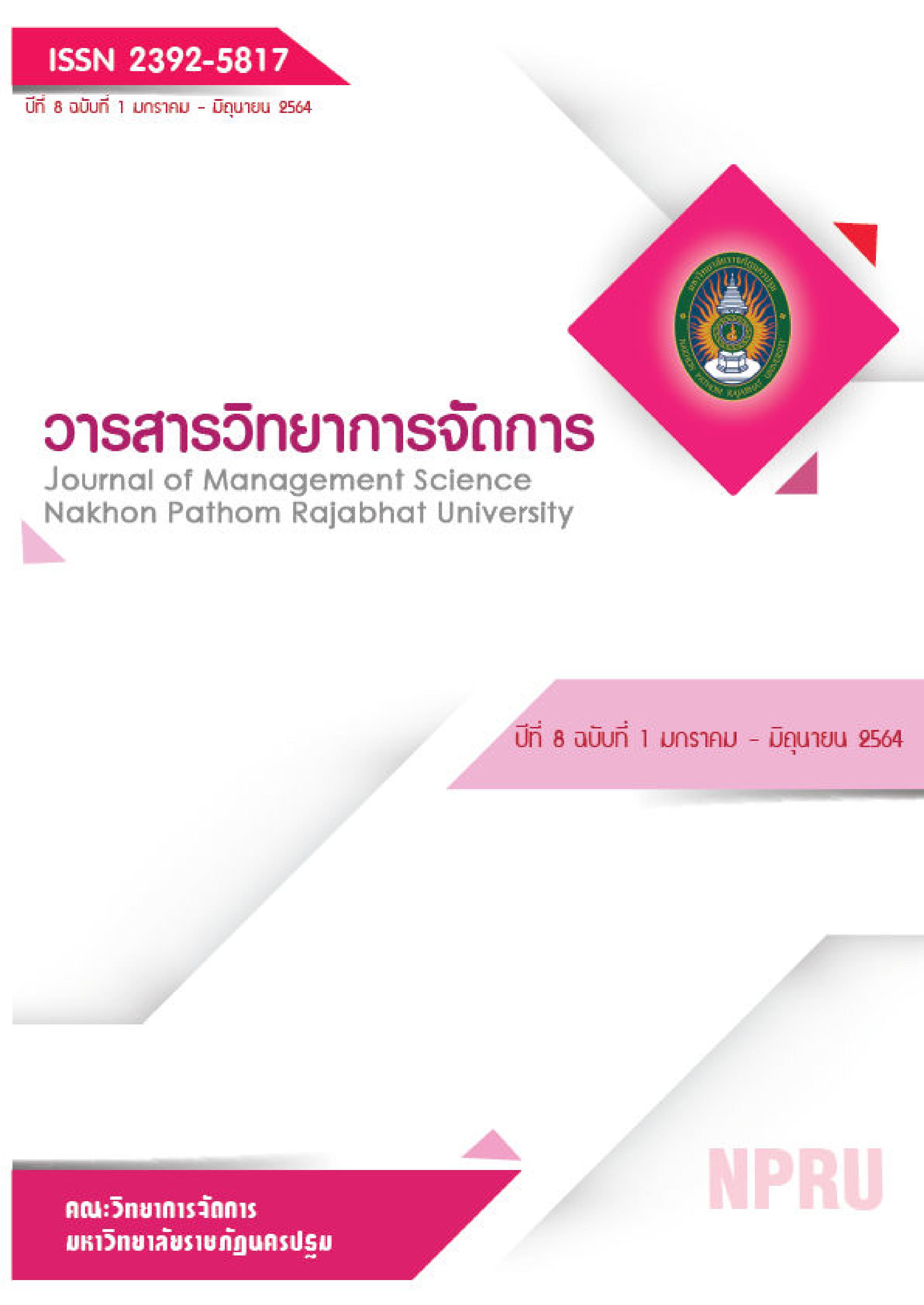The Guideline for Potential Development of Wellness tourism service providers in Wellness tourist attraction management, A case study of Nong Yai Plong hot spring community, Noang Yai Plong, Phetchaburi
Main Article Content
Abstract
The research aimed to (1) study the context of wellness tourism in Nong Ya Plong hot spring community, (2) study the need to develop the potential of the local people that acts as a wellness tourism service provider, 3) find the guidelines to develop tourism service providers' potential in wellness tourist attraction management; a case study of Nong Ya Plong hot spring community, Nong Ya Plong District, Phetchaburi Province. This research was a qualitative research by conducting a survey of the study area in Nong Ya Plong hot spring tourist attraction in Phetchaburi Province. The sampling group was 25 stakeholders, consisting of (1) community leaders, (2) local entrepreneurs, and (3) local people in the community. The data was collected by using semi-structured interview, meeting and group discussions methods with selecting purposive sampling group.
The results showed that:
1. The health tourism context in Nong Ya Plong Phu hot spring community found that; the health tourism activities were a hot - spring bathing and foot soaking, Thai health massage and nature trail hiking.
2. Regarding the need to develop the potential of the local that acted as a wellness tourism service provider, it revealed that the development needs were: (1) English youth guide development (2) English training for Thai masseuses and service providers (3) good host skills and 4) hygienic management in wellness tourist attractions.
3. The guidelines for the development of tourism service providers' potential in wellness tourist attraction management; a case study of Nong Ya Plong Hot Springs Community Nong Ya Plong District, Phetchaburi Province, to have the potential and important features as following factors: (1) English language skills (2) tourism service skills (3) sanitation and safety.
Article history: Received 18 February 2020
Revised 3 April 2020
Accepted 7 April 2020
SIMILARITY INDEX = 0.00 %
Article Details
The views and opinions of the article appearing in this journal are those of the author. It is not considered a view and responsibility of the editorial staff.
References
การท่องเที่ยวแห่งประเทศไทย. (2562.) ทิศทางท่องเที่ยวไทยในปี 2562. [ออนไลน์]. ค้นเมื่อ 2 พฤศจิกายน 2562, จาก https://www.tatreviewmagazine.com/article/tourism-thailand-2562
คณะกรรมการนโยบายการท่องเที่ยวแห่งชาติ. (2560). เเผนพัฒนาการท่องเที่ยวแห่งชาติ ฉบับที่ 2 (พ.ศ. 2560 – 2564). กรุงเทพมหานคร: สำนักงานกิจการโรงพิมพ์องค์การสงเคราะห์ทหารผ่านศึก
ณัฐพล ลีลาวัฒนานันท์. (2559). ร่างยุทธศาสตร์ส่งเสริมการท่องเที่ยวเชิงสุขภาพ. [ออนไลน์]. ค้นเมื่อ 4 พฤศจิกายน 2562, จาก https://www.mots.go.th/ewt_dl_link.php?nid=7622
นิพล เชื้อเมืองพาน .(2556). การพัฒนาศักยภาพแหล่งน้ำพุร้อนภาคตะวันตกของประเทศไทยเพื่อการท่องเที่ยวเชิงสุขภาพ. กรุงเทพมหานคร: สำนักงานคณะกรรมการวิจัยแห่งชาติ (วช.) และ สำนักงานกองทุนสนับสนุนการวิจัย (สกว.)
ผู้จัดการออนไลน์. (2561). รัฐบาลหนุน “หัวหิน-ชะอำ” เป็นต้นทางการท่องเที่ยว. [ออนไลน์]. ค้นเมื่อ 23 กันยายน 2562, จาก https://mgronline.com/local/detail/9610000022767
ประพันธ์พงษ์ ชิณพงษ์. (2560). การพัฒนารูปแบบการจัดการท่องเที่ยวอย่างยั่งยืนที่ส่งผลต่อการพัฒนามาตรฐานคุณภาพแหล่งท่องเที่ยวทางธรรมชาติของจังหวัดในเขตภาคกลาง.วารสารปัญญาภิวัฒน์. 9 (S): 31-42.
ปิรันธ์ ชินโชติ และ ธีระวัฒน์ จันทึก. (2559). รูปแบบการจัดการการท่องเที่ยวเชิงสร้างสรรค์ของสวนผึ้ง. Veridian E-Journal, Silpakorn University, ฉบับภาษาไทย สาขามนุษยศาสตร์ สังคมศาสตร์ และ ศิลปะ. 9 (1), 250-268.
รัฐศวรรธน์ กิ่งแก้ว และดำรง โยธารักษ์. (2561). การพัฒนารูปแบบการจัดการการท่องเที่ยวเชิงสุขภาพของจังหวัดนครศรีธรรมราช. กรุงเทพมหานคร: สำนักงานคณะกรรมการวิจัยแห่งชาติ (วช.) และสำนักงานกองทุนสนับสนุนการวิจัย (สกว.)
วิยะดา เลาหะราวี และราณี อิสิชัยกุล. (2553). สมรรถนะในการปฏิบัติงานของบุคลากรในธุรกิจเดย์สปาใน เขตกรุงเทพมหานคร. นนทบุรี: มหาวิทยาลัยสุโขทัยธรรมาธิราช
สำนักงานสภาพัฒนาการเศรษฐกิจและสังคมแห่งชาติ. (2561). แผนปฏิรูปประเทศด้านเศรษฐกิจ. กรุงเทพมหานคร: สำนักงานสภาพัฒนาการเศรษฐกิจและสังคมแห่งชาติ.
Marketeeronline. (2560). Wellness Tourism โอกาสของธุรกิจท่องเที่ยว. [ออนไลน์]. ค้นเมื่อ 19 ตุลาคม 2562, จาก https://marketeeronline.co/archives/21776
เรณุมาศ มาอุ่น สุจิตรา สุคนธทรัพย์ และวิภาวดี ลี้มิ่งสวัสดิ์. (2560). ศักยภาพและรูปแบบการพัฒนา บุคลากรในอุตสาหกรรมการท่องเที่ยวเชิงสุขภาพของไทยให้มีสมรรถนะที่ดีและมีคุณวุฒิวิชาชีพ. กรุงเทพมหานคร: สำนักงานคณะกรรมการวิจัยแห่งชาติ (วช.) และสำนักงานกองทุนสนับสนุนการวิจัย (สกว.)
Buchner, D., Snelling, A., and Cohen, M. (2008). Understanding the Global Spa Industry: Spa Management. (Bodeker,G. and Cohen,M. Eds.). Amsterdam: Elsevier/Butterworth Heinemann.


